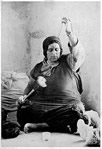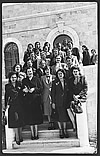The 1948 Israeli-Palestinian war created almost 750.000 Palestianian refugees, according to the United Nations Relief and Works Agency (UNRWA). Some 300.000 of these refugees were forced to settle in the small Gaza strip, half of them in special UNRWA camps. Sunbula supports these refugees and other palestinians in developing their skills wich will contribute towards economic independence and increase social stability. Since 1948, many private organizations formed aid centres throughout the West Bank and Gaza to care for the families who arrived in a steady flow after beeing forced from thier homes. Threse groups increasingly provided the means for the Palestianian communities to become more economicly independent.
In 2000 nearly half of the 2.9 million Palestinians living in the West Bank (west of the Jordan River) and Gaza was living in 27 official UNRWA refugee camps - 19 in the West Bank and 8 in Gaza. The scarcity of jobs and the overall lack of economic opportunities in Palestinian villages have created a situation as dire as that in the overcrowded refugee camps. Unemployment is high. In 2000 the average daily wage in the Palestinian teritories was about $ 14. Over half the population is under age 15. The 1967 Israeli occupatioin of the West Bank and Gaza has produced a dependent economy. Since the beginning og the Palestinian intifadah (uprising), the Israeli occupation har completely isolated villages and cities from each other and from Jerusalem.
Suddenly, Jerusalem, the religious centre and marketplace par exellence, was forbidden, and still is, to those Palestinians who do not carry the special blue identity card signifying Jerusalem residency. People living in Gaza can no longer leave the area, even visit the West Bank, without special and limited permission. Palestinians living in Jericho, Bethlehem, Nablus, Tulkarem and elsewhere is banned from visiting or trading in Jerusalem, or even entering Gaza without special entry/travel permits. The isolation of the Palestinian areas has been exacerbated by the unrelenting growth of Israeli settlements buildt around Palestinian towns and cities. The settlements' ability to pay higher wages to Palestinian workers has substituted blue-collar jobs in the settlements buildings for the traditional Palestinian agrarian economy. For the past 400 years Palestine has been under the Ottoman Empire, the British Mandate, Egyptian and Jordanian rule and Israeli occupation. Since the September 1993 establishment of the Iterim Selfgoverment Arrangements, Palestinians have dilligently worked on governmental institution-building with help from many foreign donor governments.
After its people, the most valuable Middle East commodity is water. The scarcity of water har become critical in hte last few years. Since the 1967 war, Palestinian water resources have been under the overall control of the Israeli government. Per capita allotment to Palestinians is 1/3 of what Israelis consume freely. Palestinians villages like Idna, in the northwestern Hebron Hills, and Rantis, near ben Gurion airport on the Israeli frontier have no running water. In 2000, the Japanese government and the United Nations Developement Programme (UNDP) began constructing water tanks in these and other villages.
Against these background of occupation, privation and scarce resouces, Sunbula was formed to assist Palestinians to support themselves. In the context of the Intifadah (the first), Sunbulas predecessor, Craftaid, was born. The brainchild of Carol Morton, wife of the Rev. Colin Morton, pastor of St. Andrew's Scots Memorial Church, Craftaid filled the need for an outlet for Palestinian crafts. Travelling extensively in hte Occupied Teriitories, she saw the creation of beautifull embroidery and other products with few markets through which to sell these crafts. With great imagination Carol appropiated a small bathroom next to the St. Andrew's receptionoffice and transformed it into a shop. After a couple of years almost thirty groups were providing a wide variety of beautiful crafts for sale in the tiny outlet. It consited of women's groups, centres for handicapped and refugee camps.
Products from twelve of Sunbula's groups are represented in our Online Catalogue.
You can get information on the groups and the daily life of a women refugee by clicking here.




